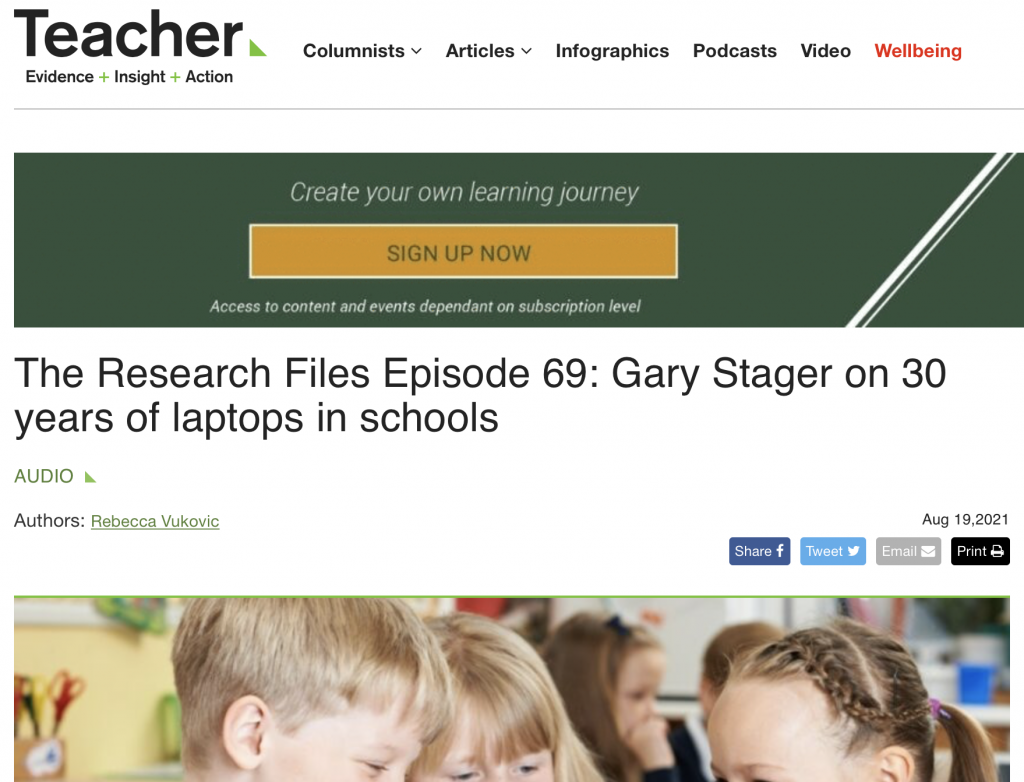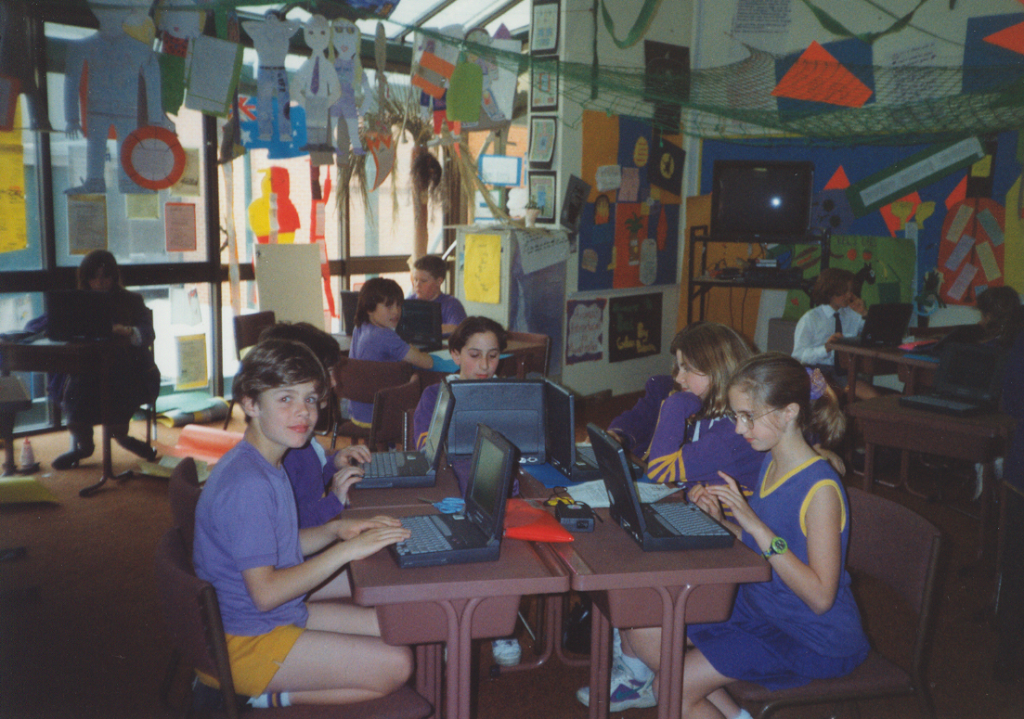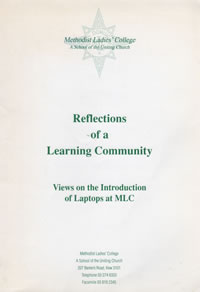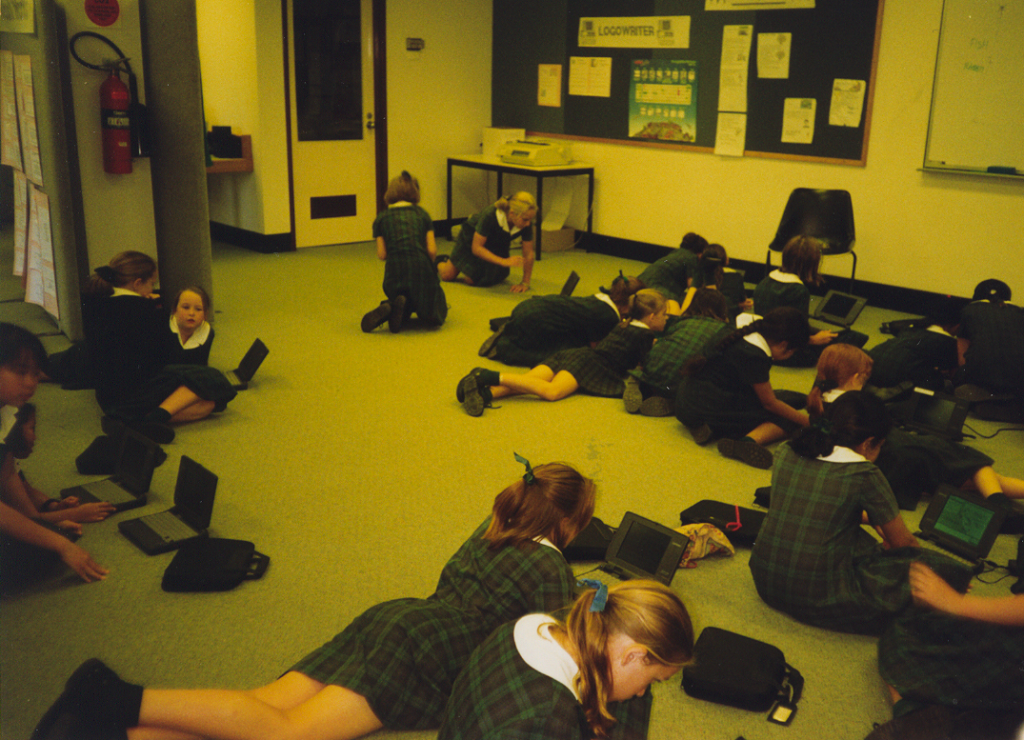Lots of schools are quick to tell me that they were the 3rd laptop school, but I know the first two for sure!
By Gary Stager (2021)
In July 1990, I made my first trip to Australia to speak at the World Conference on Computers in Education, held at what was then the new Darling Harbor Convention Centre. Not only did this represent the realization of a childhood dream of visiting Downunder, but the conference brought together US “Logo legends,” including Seymour Papert, Alan Kay, Brian Silverman, Steve Ocko, and Mitchel Resnick with remarkable Logo-using educators from Australia and around the world. Upon arrival in Sydney, I was transported to a large multi-day joyfully chaotic Logo and robotics pre-conference workshop. The workshop participants were teachers and kids from schools in which everyone had a personal laptop computer. I had a ball and collaborated with some Aussie kids to build a working fax machine out of LEGO. This trip would be the start of something big – a longterm love affair with Australia, lifelong friendships, and countless professional adventures across that continent. I even earned my Ph.D. at The University of Melbourne.
During WCCE, I was invited to return to Australia to lead professional development activities at what were the first two schools in the world to commit to universal personal computing. In other words, every student would have their own laptop computer to be used across the curriculum. Best of all, the schools embraced Papert’s learning theory of constructionism and the progressive education practices required to nurture constructionist learning. At the time, I didn’t know any adults in the US who had their own laptop, but here I was in a strange land helping children invent the future of education. I surely learned more than I taught, but remain incredibly grateful for the opportunities afforded me to show the world that things need not be as they seem. The faith and trust invested in me by David Loader, arguably the world’s most accomplished school principal, continues to blow my mind.

Two Australian schools began the 1:1 revolution
Victoria’s (private) Methodist Ladies’ College (MLC) has been fairly well documented, but the pioneering work of the other school, Queensland’s (public) Coombabah State School, has been quickly fading from memory. I’ve done my best to preserve, curate, and share as much of the work documenting the early days of 1:1 computing in schools (with more left to locate), but evidence from Coombabah has been scarce. A great book was even written about the MLC 1:1 efforts. Coombabah was significant because it was the site of the first 1:1 personal computing a co-ed public school. At the time, the State of Queensland was talking about every child in the state having their own laptop by 1991.
What happened in Australia more than thirty years ago matters because we stand on the shoulders of giants and because there remains no universal adoption of personal computing for children. This ongoing controversy demonstrates a lack of consensus behind empowering children.
“Girls’ School Leads Laptop Revolution”
THE AGE (NEWSPAPER) – 1993
I knew that at least two books of scholarship about the Coombabah 1:1 experience were published by the Australian Council for Educational Research, but books had gone out-of-print. After several years of email, begging, and pleading, a lovely woman at ACER, Pru Mitchell, scanned the two books I was aware of, plus another, and made them available. These three recently uncovered texts, along with seminal articles, and the book MLC published about their approach to 1:1 computing may be found here.

Recently, Australia’s Teacher Magazine interviewed Gary Stager for a podcast and dusted away the cobwebs to remember the magical early days of 1:1 computing in schools. The audio podcast and transcript may be found here.

Resources and & Further Reading
Girls’ School Leads Laptop Revolution (1993)
Newspaper coverage of the birth of 1:1 computing

This book was published by Methodist Ladies’ College to share with educators interested in personal computing. A PDF version may be downloaded here.

Hard and Easy: Reflections on my ancient history in 1:1 computing
Gary Stager’s reflection on his early experiences leading professional development in the world’s first laptop schools
Why Logo? – One Courageous School’s Attempt to Make Learning Personal (1993)
What you do with 1:1 computing matters!
Laptop Schools Lead the Way in Professional Development (1995)
An article Gary Stager authored for ASCD’s Educational Leadership. Filled with interesting suggestions that stand the test of time.
Laptops and Learning: Can laptop computers put the “C” (for constructionism) in Learning? (1998)
Published in the October 1998 issue of Curriculum Administrator
Seymour Papert’s 2000 speech at Bates College on the eve of Maine going 1:1
Stager, G. S. (2000). Dream bigger. In J. Little & B. Dixon (Eds.), Transforming learning – an anthology of miracles in technology-rich classrooms (pp. 109-122). Port Melbourne, Victoria, Australia: Kids Technology Foundation.
Girls and Technology – Overcoming Myths & Malpractice (2002)
Text from a keynote address I gave in Melbourne, Australia


Laptops Keep Falling on My Head
Maine’s great laptop experiment should not be picked at, but applauded
Preserving History
During the (US) summer of 1990, I had the great fortune of leading professional developments in the world’s first two 1:1 “laptop schools.” This work was rooted in the vision of Seymour Papert and sought to reinvent schooling in a modern progressive fashion. The work of Methodist Ladies’ College in Kew (Melbourne), Victoria is widely remembered as the world’s first laptop school, due to its visionary principal David Loader and its remarkable faculty. They committed to every child having a personal laptop computer and programming it across the curriculum in 1989. Around the same time, the Australian State of Queensland publicly committed to 1:1 computing, starting with a pilot project at the Coombabah State Primary School. I worked in both locations initially and my American public education sensibilities predicted that the Queensland effort would be most successful. I was quite wrong, but was blessed to continue working with MLC and countless other Australian schools over the past 31 years.
The “MLC Story” has been well documented in conference papers and books, but the equally important Coombabah Project could easily be lost to history. I was aware of two research-based books published about this work and have been eager to get my hands on copies for many years. I’ve spent the past decade or so badgering colleagues to help me locate, preserve, and disseminate the books published by Australia’s premiere educational research institution, the Australian Council for Educational Research (ACER). Thanks to Pru Mitchell and her colleagues, that work is now available as a historical record and for future scholarship. They even produced a thesis I was unaware of.
I could not be more excited to share this news with the world! (The following documents may be downloaded as PDFs)
- Evaluating the integration of learning technology in Queensland state schools: A case study of the Queensland Sunrise Centre, Thesis by Glenn D. Finger
- Learning with personal computers: issues, observations and perspectives, Helga A.H. Rowe, Irene Brown, and Isabel Lesman
- The Queensland Sunrise Centre: a report of the first year, Michael Ryan, Jenny Betts, Greg Grimmett, Karen Hallett, and Dave Mitchell

The following are some of the other seminal books, doctoral theses, and articles detailing the origins of 1:1 computing in Australian schools and the world. Reflections of a Learning Community is digitized and online. One day, I hope to share the rest of the documents and more.
- Grasso, I., & Fallshaw, M. (1993). Reflections of a learning community: Views on the introduction of laptops at mlc: Methodist Ladies’ College.
- Johnstone, B. (2003). Never mind the laptops: Kids, computers, and the transformation of learning. Seattle: iUniverse.
- Little, J., & Dixon, B. (Eds.). (2000). Transforming learning – an anthology of miracles in technology-rich classrooms. Port Melbourne, Australia: Kids Technology Foundation.
- McDonald, H. J. (1995). Learning, laptops and logowriter: A study of teacher change. Monash University. (doctoral thesis)
- Stager, G. S. (1995). Laptop schools lead the way in professional development. Educational Leadership, 53(2), 78-81.
Postscript
The passage of time is cruel to history. Countless memos, newsletters, papers, and student projects from the early days of 1:1 computing are lost, perhaps forever. One of the world’s leading PR firms took thousands of photos, just three decades ago. None can be found. Cherish, curate, and maintain your memories for future generations to enjoy and learn from!
